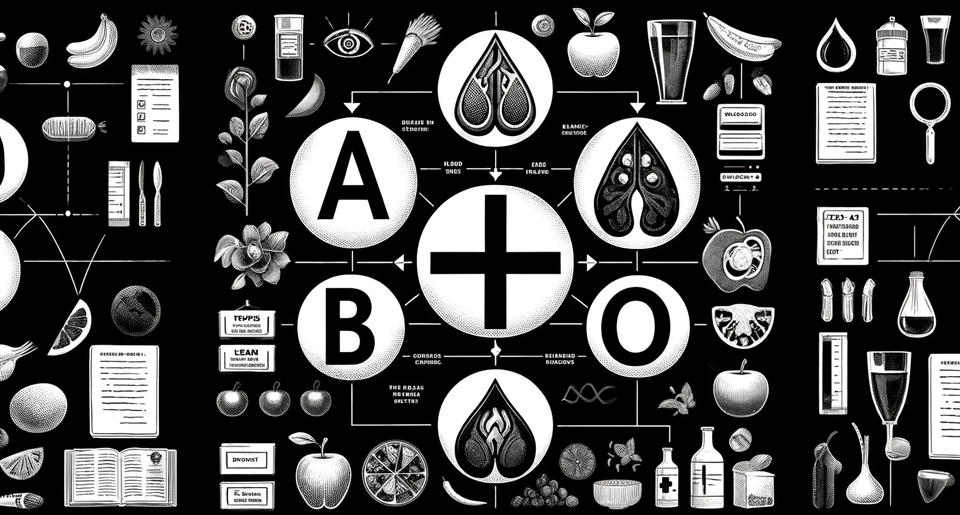The Blood Type Diet Does It Work?

Have you ever heard about the blood type diet? It’s an intriguing idea that suggests your blood type determines the best diet for you.
But, is there any truth to it?
Let’s dive into what this diet is, and if it is something you must consider.
What Is the Blood Type Diet?
The blood type diet became famous thanks to the book Eat Right for Your Type by Peter D’Adamo, a naturopath. The theory claims that your ABO blood type (A, B, AB, or O) should dictate your dietary habits.
According to D’Adamo, people with different blood types digest food differently, and eating according to your blood type can improve your health and lower the risk of chronic diseases.
Here’s a quick breakdown of the diet recommendations based on blood types:
- Type A: A vegetarian diet, focusing on fruits, vegetables, tofu, and grains.
- Type B: A balanced diet including meat, dairy, grains, beans, and vegetables.
- Type AB: A mix between types A and B, with an emphasis on tofu, seafood, dairy, and green vegetables.
- Type O: A high-protein diet rich in meat, fish, vegetables, and limited grains.
The Science (or Lack Thereof) Behind the Blood Type Diet
Despite its popularity, the blood type diet lacks scientific support.
Researchers from the University of Toronto (U of T) examined this theory and found no evidence to back it up. In a study published in PLoS One, Dr. Ahmed El-Sohemy and his team analyzed data from 1,455 participants. They aimed to see if blood type had any effect on health markers when following the blood type diet.
The findings were clear: the diet's effectiveness was not influenced by the participants' blood types.
Dr. El-Sohemy stated, "The way an individual responds to any one of these diets has absolutely nothing to do with their blood type and has everything to do with their ability to stick to a sensible diet they were ascribed to."
In other words, how well you adhere to a balanced diet matters more than your blood type.
The study measured various health markers such as insulin, cholesterol, and triglycerides. The results showed that these health indicators improved independently of blood type, meaning that any observed benefits were due to general healthy eating rather than a diet tailored to blood type.
What Should You Focus On Instead?
If the blood type diet doesn’t hold up under scrutiny, what should you focus on for a healthier diet?
Here are some tried-and-true principles that can help you achieve better health outcomes:
- Minimally Processed Foods: Choose whole, unprocessed foods over processed ones. Whole foods retain more nutrients and are free from added sugars, unhealthy fats, and artificial ingredients.
- Lean Proteins: Incorporate lean protein sources such as chicken, fish, beans, and legumes into your diet. Protein is essential for building and repairing tissues, and it helps keep you feeling full.
- Fruits and Vegetables: Aim to fill half your plate with a variety of fruits and vegetables. They are packed with vitamins, minerals, and fiber that support overall health.
- Balanced Diet: Ensure your diet includes a balance of carbohydrates, fats, and proteins. Opt for whole grains, healthy fats (like those from nuts, seeds, and avocados), and a mix of protein sources.
- Hydration: Don’t forget to drink plenty of water. Staying hydrated is crucial for every bodily function, from digestion to circulation.
- Consistency: Stick to a healthy eating pattern consistently. It’s the long-term habits that make the biggest difference.
Reflection Prompts
- Diet Review: Take a look at your current diet. How many processed foods are you consuming daily? What changes can you make to include more whole foods?
- Protein Sources: Consider your protein intake. Are you getting enough lean protein in your meals? What new sources of protein can you try?
- Vegetable Variety: Think about the variety of fruits and vegetables you eat. Can you add a new fruit or vegetable to your diet each week?
Focusing on a balanced diet rich in minimally processed foods, lean proteins, and plenty of fruits and vegetables is a proven way to improve your health.
Forget about the blood type diet and stick to these fundamentals for the best results.
By adopting these healthy eating habits, you'll be on your way to a healthier, happier you. So, let’s skip the pseudoscience and focus on what really works!